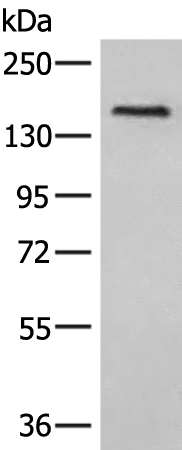
| WB | 咨询技术 | Human,Mouse,Rat |
| IF | 咨询技术 | Human,Mouse,Rat |
| IHC | 咨询技术 | Human,Mouse,Rat |
| ICC | 技术咨询 | Human,Mouse,Rat |
| FCM | 咨询技术 | Human,Mouse,Rat |
| Elisa | 1/5000-1/10000 | Human,Mouse,Rat |
| Aliases | FH; HF; HF1; HF2; HUS; FHL1; AHUS1; AMBP1; ARMD4; ARMS1; CFHL3 |
| WB Predicted band size | 139 kDa |
| Host/Isotype | Rabbit IgG |
| Antibody Type | Primary antibody |
| Storage | Store at 4°C short term. Aliquot and store at -20°C long term. Avoid freeze/thaw cycles. |
| Species Reactivity | Human |
| Immunogen | Synthetic peptide of human CFH |
| Formulation | Purified antibody in PBS with 0.05% sodium azide and 50% glycerol. |
+ +
以下是关于补体因子H(CFH)抗体的3篇代表性文献的简要总结:
---
1. **文献名称**:*Autoantibodies to complement factor H in atypical hemolytic uremic syndrome*
**作者**:Dragon-Durey MA, et al.
**摘要**:该研究首次报道了非典型溶血尿性尿毒症综合征(aHUS)患者中存在针对CFH的自身抗体。这些抗体会干扰CFH与C3b的结合,导致补体过度激活,提示其与疾病发病机制相关。
---
2. **文献名称**:*Factor H autoantibodies in patients with age-related macular degeneration*
**作者**:Skerka C, et al.
**摘要**:研究发现部分年龄相关性黄斑变性(AMD)患者体内存在抗CFH的自身抗体,这些抗体可能通过破坏CFH在视网膜组织中的功能,促进炎症反应和血管损伤,从而参与AMD的病理过程。
---
3. **文献名称**:*A novel CFH mutation in a Japanese family with complement factor H deficiency and autoimmune antibodies*
**作者**:Yamamoto S, et al.
**摘要**:报道了一例由CFH基因突变导致的补体因子H缺陷病例,患者体内同时检测到高滴度的CFH自身抗体。研究揭示了遗传缺陷与自身免疫反应共同加剧补体失调的机制。
---
4. **文献名称**:*Anti-factor H antibodies in children with dense deposit disease*
**作者**:Kavanagh D, et al.
**摘要**:针对儿童致密物沉积病(DDD)的队列研究发现,部分患者存在抗CFH抗体,这些抗体可能通过影响补体旁路途径的调控,导致肾小球基底膜损伤和疾病进展。
---
**备注**:如需具体文献来源或进一步检索,可补充提供研究领域或疾病背景(如aHUS、AMD或肾病),以便推荐更精准的参考文献。
**Background of CFH Antibodies**
Complement Factor H (CFH) is a critical regulatory protein in the complement system, primarily inhibiting the alternative pathway to prevent excessive immune activation and host tissue damage. Dysregulation of CFH, whether due to genetic mutations, autoantibodies, or functional impairment, is linked to several diseases, including atypical hemolytic uremic syndrome (aHUS), age-related macular degeneration (AMD), and C3 glomerulopathy (C3G).
CFH autoantibodies, first identified in aHUS patients, are polyclonal IgG antibodies that bind to the C-terminal region of CFH (domains 19-20), disrupting its ability to protect host cells from complement-mediated damage. This leads to uncontrolled complement activation on endothelial cells, causing thrombotic microangiopathy. In AMD, CFH polymorphisms (e.g., Y402H) and autoantibodies may contribute to chronic inflammation in the retina.
Research into CFH antibodies has expanded diagnostic and therapeutic approaches. Detection methods like ELISA aid in identifying autoimmune-associated aHUS or C3G. Therapies targeting complement pathways (e.g., eculizumab) or removing autoantibodies (plasma exchange) are clinically used. Recent studies also explore monoclonal antibodies to restore CFH function or block pathogenic autoantibodies.
Understanding CFH antibodies highlights the interplay between genetic susceptibility, autoimmunity, and complement dysregulation, offering insights for precision medicine in complement-related disorders.
×